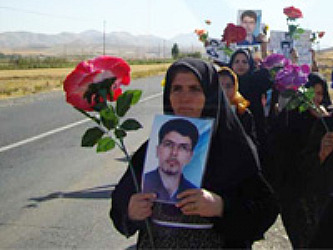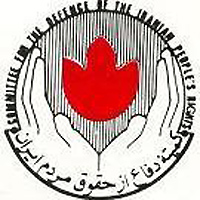
International condemnation by trade unionists and human rights activists has greeted the execution of five political prisoners by the Iranian authorities on May 9. The response of the international community was followed by a general strike in the Kurdistan province in the west of Iran on May 13 in protest at the executions. Shops, factories, schools and many offices were closed in the region as the regime deployed the military in key towns in the area.
In a letter to the Iranian government the International Trade Union Confederation (ITUC) has urged the Iranian president to halt any further escalation of trade union repression and human rights abuses against trade union members. The ITUC is to complain to the International Labor Organization Committee on Freedom of Association about the Iranian regime’s gross violation of the principles of the ILO. It has called upon its affiliates across the entire world to denounce the executions.
“The ITUC is shocked with what happened to Farzad Kamangar [a 35-year-old teacher and member of the Teachers’ Trade Association of Kurdistan]. Imprisoned trade unionists must be freed and all other threats of imprisonment against independent trade unionists for their legitimate activities must be lifted,” said Guy Ryder, ITUC General secretary.
On May 11, the British Trades Union Congress general secretary, Brendan Barber, supported the ITUC position and pledged the solidarity of trade unionists in the UK with those in Iran, confirming this in writing to the Iranian ambassador to the UK.
“The TUC will call on its affiliates to denounce this inhumane act, and show solidarity with our Iranian brothers and sisters,” states Mr. Barber. “In that respect, we continue to express concern about the other teachers and trade unionists languishing in Iran’s jails, such as bus workers leaders Mansour Osanloo and Ebrahim Madadi. I cannot emphasize enough the damage that this execution has done to the reputation of Iran and your government.”
Farzad Kamangar, an active member of his local teacher’s union, was arrested by Ministry of Intelligence officials along with two other members of the Kurdish minority, Ali Heydariyan and Farhad Vakili, in Tehran around July 2006. The three men were sentenced to death on Feb. 25, 2008, after being accused of taking up arms against the state, in connection with their alleged membership in the armed group, the Kurdistan Workers Party (PKK). The trial took place in secret, lasted only minutes, and failed to meet Iranian and international standards of fairness.
Heydariyan and Vakili also received additional sentences of 10 years’ imprisonment for forging documents. Under Iranian law, they must serve their prison sentences before being executed. The death sentences of all three men were upheld by the Supreme Court. Ali Heydariyan and Farhad Vakili were executed on May 9 along with Farzad Kamangar, Mehdi Eslami and Shirin Alam Hooli.
All five victims had repeatedly rejected the allegations of being involved in terrorist activities. In the case of Kamangar, his main “crime” was that during a short visit to Tehran he had stayed in the house of Heydaryan and Vakili whom he knew. The authorities alleged that they had discovered explosive materials from a car belonging to Heydaryan and Vakili. Kamangar’s crime in effect was that he was in the wrong place at the wrong time.
Shirin Alam Hooli was a 28-year-old Kurdish woman who had been sentenced to death in Iran for her alleged support for PJAK, a militant opposition group. Convicted of “enmity against God,” since her arrest she had routinely and repeatedly been subjected to torture and degrading treatment to confess to supporting PJAK. She had no access to legal representation during her long and grueling interrogation period. Her rights as an accused were never observed.
The left and progressive movement in Iran has categorically condemned these executions. The Tudeh Party of Iran, in a statement last week, condemned the regime’s action. While expressing concern about the continuation of executions and the dangers that are threatening the lives of all political prisoners, especially those followers of ideologies other than Islam, the Tudeh Party called for the establishment of a united campaign to resist and stop the crimes and executions in the prisons of the Islamic Republic.
Throughout the week there were a number of protest demonstrations across Europe to condemn the regime’s action. In Paris, on Monday, the demonstrators attacked the regime’s Embassy and 200 people were arrested.
Jamshid Ahmadi, assistant general secretary of the Committee for the Defence of the Iranian People’s Rights (CODIR), strongly condemned the action of the Iranian regime in executing the five political detainees.
“Fearing the eruption of a new wave of popular protests on the first anniversary of the fraudulent presidential election of 12 June 2009, the regime has attempted to spread a climate of fear and terror in Iran,” he said.
“The regime’s rush to execute these prisoners, in the face of international concerns about the worsening of the human rights situation over the past year, is a disgrace. Instead of engaging in dialogue with international human rights agencies such as Amnesty International and the UN Commission on Human Rights, the regime is intensifying its murderous activities against the opposition. It seems that the clerical regime does not want to take any notice of international public opinion. As we can see from the response of the people of Kurdistan yesterday, this will be a very dangerous tactic.”
Further information on Iran is available at www.codir.net or by contacting codir_info@btinternet.com
Photo: A 2008 rally to appeal for the life of Farzad Kamanger, on the road leading to Tehran. (Education International www.ei-ie.org)












Comments